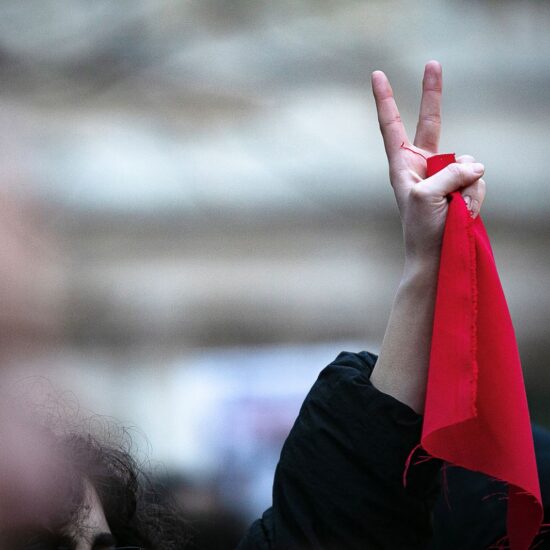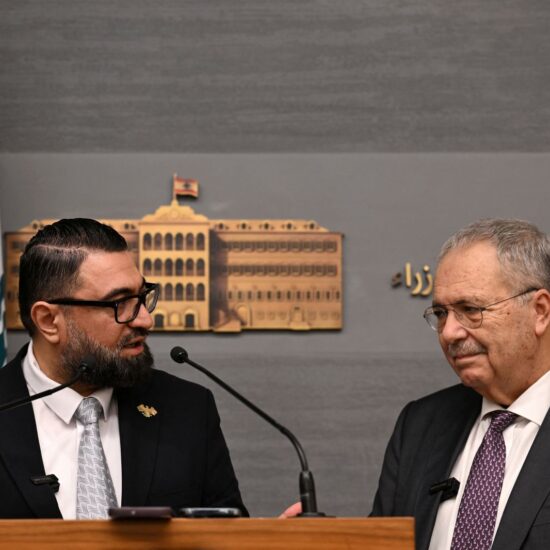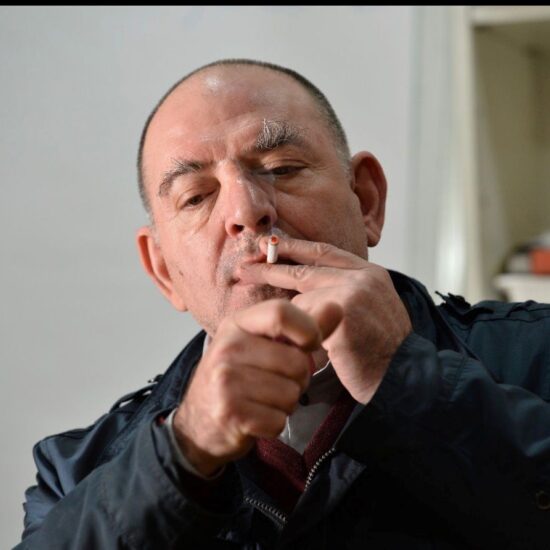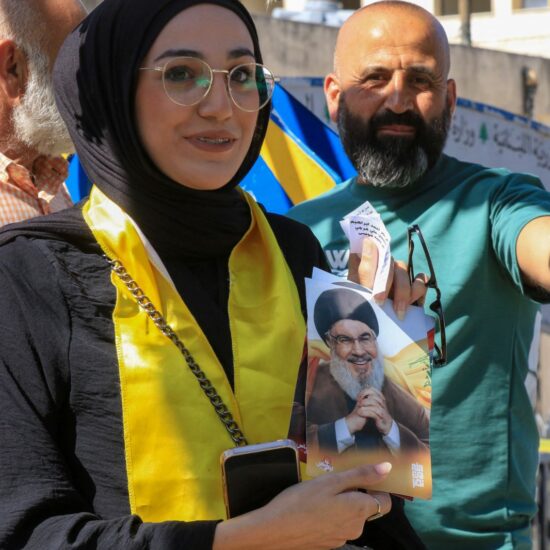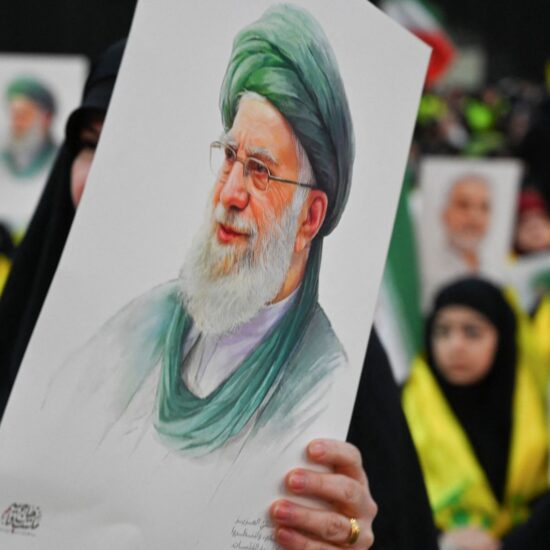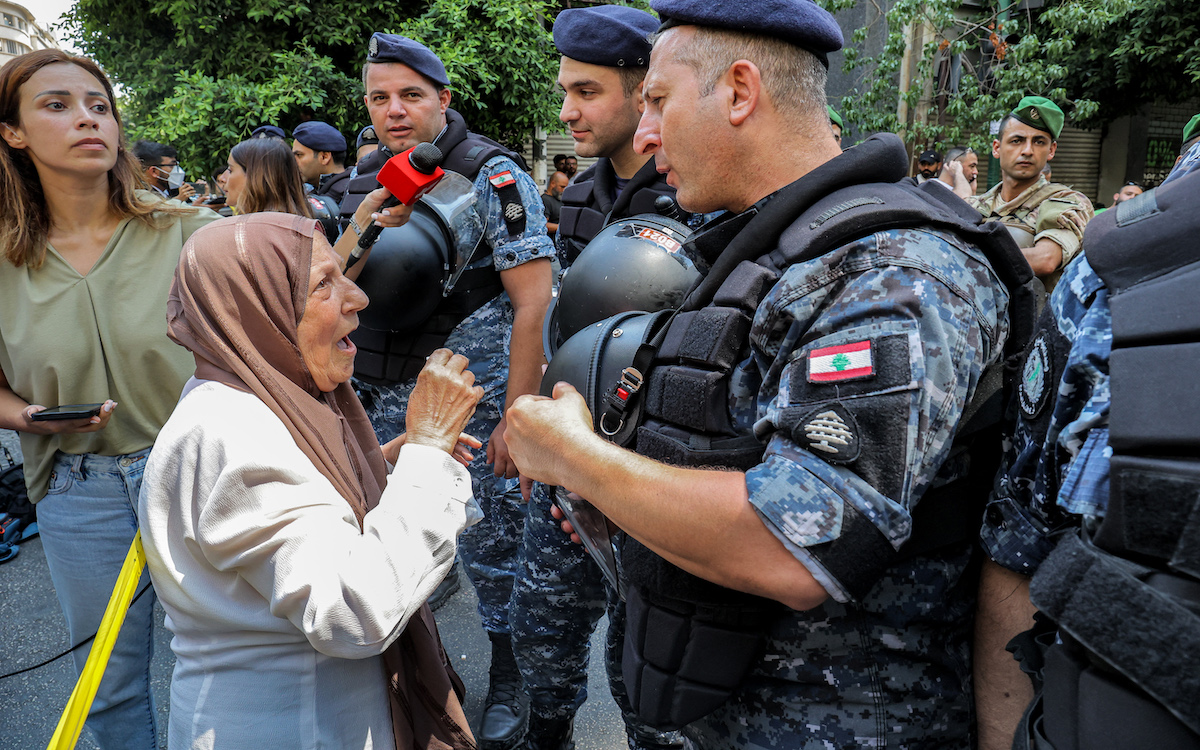
For most of the world, Bassam al-Sheikh Hussein is just another bank robber and criminal; someone that should be condemned and held accountable for his actions.
But in Lebanon, it is different.
When al-Sheikh Hussein took over a bank in Beirut’s Hamra district, he quickly became a heroic symbol for the millions of people in Lebanon who are facing dire situations because they cannot access their money.
The economic crisis has ruined so many lives after the banks implemented informal capital controls, limiting when and how much money depositors were able to access from their own accounts.
Normal people do not just decide to rob a bank and hold people hostage. They need to be pushed to this point and be desperate enough that the consequences, namely incarceration, do not matter anymore.
That is why al-Sheikh Hussein appealed to so many people, and why a large crowd gathered in his support outside of the bank, cheering him on and denouncing the banks.
It was a scene right out of the popular Netflix Series La Casa de Papel (Money Heist), where the titular “protagonists” hold people hostage while robbing the Royal Mint of Spain.
People were not supporting him because they approved of what he was doing. But they understood why he was doing it.
He needed the money. His money. And if the banks and the politicians were not going to do something about the situation, even after nearly three years, then he had to do something for himself and his family.
In the end, al-Sheikh Hussein received $35,000 of his money and turned himself in, likely to be released in a couple of weeks once all of this has blown over.
Unless reforms are implemented and people are able to access their money without going through the humiliating process of begging the banks for their own funds, this may not be the last time that we see such stories.
While we may not agree with the method, for the countless people in similar situations to al-Sheikh Hussein, what other choice do they have at this point?
In Lebanon
Playing the field: Eyebrows were raised when Druze leader Walid Joumblatt met with Hussein Khalil, the political advisor to Hezbollah’s secretary-general, Hassan Nasrallah, on Thursday, August 11. Joumblatt was cooperating with a group that he has opposed for years. Then he sent his son, Taymour, and a small delegation to meet with Maronite Patriarch Bechara al-Rai the following day, making it clear that he was looking to play all sides of the political spectrum.
Reportedly, during his meeting with Khalil, Joumblatt discussed the various issues facing Lebanon, in particular the upcoming presidential elections after the current president, Michel Aoun, leaves office in October.
Joumblatt has so far refused to support any candidate proposed by the March 8 bloc, and has argued that there need to be many more consultations to come to a consensus on a candidate and that these meetings should not exclude any party.
Despite his meeting with Hezbollah, Samir Geagea, the leader of the Christian Lebanese Forces and staunch opponent of Hezbollah, appeared to still back Joumblatt, saying in a speech that Joumblatt has “never been in the arms of Hezbollah” and that “our relationship with him continues.”
Nevertheless, some pointed out that Joumblatt seems to switch sides depending on which way the wind is blowing.
كلن الا البيك pic.twitter.com/8JOryDtJaI
— Human (@hyazbeck) August 12, 2022
Keeping the lights on (for now): Prime Minister-designate Najib Mikati announced that Iraq had agreed to supply Lebanon with monthly fuel imports for another year as the country continues to grapple with a constantly worsening economic crisis.
While this will likely be celebrated as a win, it is only a temporary solution for Lebanon’s failing energy sector.
The Iraqi fuel will help Lebanon’s state electricity company, Électricité du Liban, to continue providing around two to three hours of electricity per day. But it does nothing to reform the sector and complement the many changes that are desperately needed.
Even if EDL were to stop providing electricity, few in Lebanon would notice, as the majority of electricity is provided by increasingly expensive private generators.
Changing course: A ship that was carrying around 26,000 tons of Ukrainian grain is no longer going to deliver the shipment to Lebanon, and is instead heading to the Syrian port of Tartous.
#BREAKING: The Razoni – the ship that was meant to bring 26,000 tonnes of corn to Lebanon earlier this month until the buyer changed his mind – is approaching the Syrian port of Tartous this morning instead, two shipping sources tell @Reuters
— Maya Gebeily (@GebeilyM) August 14, 2022
The week prior, another ship allegedly carrying Ukrainian grain was stolen by Russia following the latter’s invasion, departed the Lebanese port in Tripoli also for Tartous.
Lebanon is currently facing bread shortages, with people lining up outside bakeries early in the morning to ensure at least a package of bread.
Lebanon’s Parliament approved the use of a $150 million loan from the World Bank to secure grain imports for at least six months.
Attack on the press: Lebanese photojournalist Hassan Shaaban has received yet another threat from supporters of Hezbollah in his hometown of Beit Yahoun after finding the tires to his car slashed and a note attached telling him to “leave the village.”
لا يزال المصوّر حسن شعبان يتعرّض للمضايقات والتهديد في بلدته بيت ياحون الجنوبية، حيث أقدم مجهولون ليلاً على تمزيق إطار سيارته ووضع تهديد عليه تضمّن التالي: “فل من الضيعة يا عميل يا كلب”، وذلك إثر تغطيته الاعتصامات في البلدة.@hasanshaaban pic.twitter.com/J4TR6m2Ir0
— Samir Kassir Eyes (@SK_Eyes) August 14, 2022
This came just over a week after Shaaban was assaulted by Hezbollah supporters while covering protests in the area. Following the assault, he found a bullet attached to his car, a clear death threat.
رصاصة على شباك سيارة المصوّر حسن شعبان صباح اليوم، وذلك بعد تهديده بالقتل والاعتداء عليه بالضرب من قبل مناصري “#حزب_الله” أمس، إثر تغطيته الاعتصامات في بلدة بيت ياحون في الجنوب.@hasanshaaban pic.twitter.com/06loPCvKgz
— Samir Kassir Eyes (@SK_Eyes) August 4, 2022
Journalist Dima Sadek has also received threats recently from supporters of Hezbollah after she blamed the group and Iran for the attempted murder of Salman Rushdie in New York.
وقالت صادق “أتعرّض منذ الصباح لحملة تحريض وصلت لحد المطالبة علنا بهدر الدم، في حملة أطلقها جواد حسن نصرالله. وعليه أرجو اعتبار هذا التويت بمثابة إخبار للسلطات اللبنانية، كما أني أُحمل علنا ورسمياً قيادة حزب الله المسؤولية الكاملة لأي مكروه قد يقع علي من الآن وصاعداً. pic.twitter.com/mU5F1gTdsQ
— Samir Kassir Eyes (@SK_Eyes) August 13, 2022
Condemnation: Following the attack on the author Salman Rushdie, supporters of Iran and Hezbollah praised the attacker Hadi Matar for his efforts.
However, not everyone was behind him, particularly people from his hometown.
Residents of Yaroun condemned the attacks, with his father isolating himself and refusing to meet with anyone.
According to the Mayor of Yaroun, Ali Qassem Tuhfa, many of the town’s residents did not even really know who Matar is, but condemned and questioned his actions either way.
In the region
More strikes on Syria: Three Syrian soldiers were killed and another three injured when Israel launched an airstrike on the port city of Tartous from Lebanese airspace last night.
According to the Syrian Observatory for Human Rights, the strike targeted a Syrian army air defense base in the Abu Afsa area which has been previously used by Iran-backed fighters.
Israel regularly violates Lebanon’s sovereignty by flying its planes over the country to strike Iran and Hezbollah positions in Syria, although Israel hardly ever comments on such strikes.
Free Austin Tice: President Joe Biden said that the US is sure that the Syrian government is holding journalist Austin Tice after he was abducted while reporting on the country’s civil war 10 years ago.
Biden also called on Syrian President Bashar al-Assad to release Tice, something that is unlikely to happen unless the US makes concessions to the regime, in particular regarding sanctions relief.
Back in May, Lebanon’s general director of general security, Abbas Ibrahim, flew to Washington DC as part of mediations between the US and Syria to secure Tice’s release.
The Syrian government continues to deny that it is holding Tice.
The rivalry: Supporters of Shiite cleric Muqtada al-Sadr have continued to protest outside of Iraq’s Parliament in Baghdad’s Green Zone while members of the Iran-backed rival, the Coordination Framework, work to form a government and find a political solution that brings one of their people into power.
Al-Sadr put a Wednesday deadline on Parliament to dissolve and for new elections to be called after a 10-month political stalemate where no new president or government has been chosen.
It is not clear what will happen if the deadline comes and his demands are not met, but any violence and bloodshed could bring the highly influential Ayatollah Ali al-Sistani off of the sidelines as he has remained silent over the recent weeks to ensure that he does not appear to take any sides.
Neither al-Sadr nor the Framework seems to be willing to compromise, meaning protests are likely to continue with no end in sight.
A tragic church service: At least 41 people were killed after a fire broke out at a Coptic church in Giza leading to a stampede during a Sunday morning service.
According to Egypt’s health ministry, most of the deaths were caused by smoke inhalation and trampling.
The fire has led to criticism of the government for its lax safety standards and poor oversight as well as the fact that it took two and a half hours for emergency services to finally arrive.
Christians in Egypt have long felt that they were subject to restrictions by the government, but have been afraid to speak out and have built places of worship without the government’s authorization. The church that burned on Sunday was built without a permit and was not licensed until a few years after it was constructed.
Shooting in the Holy Land: Eight people were shot at a Jerusalem bus stop on Sunday by a Palestinian man who later turned himself in to authorities.
The man is not believed to be affiliated with any groups.
The shooting came a week after Israel bombarded Gaza in a primitive strike after security forces arrested the Palestinian Islamic Jihad leader in the West Bank Bassem al-Saadi.
The shooting did not appear to be in retaliation to the weekend-long bombardment.
For several months, there has been increased clashes and fighting between Israelis and Palestinians.
Iran’s plot to kill John Bolton: The US Justice Department charged Shahram Poursafi, a member of Iran’s Revolutionary Guard Corps, with plotting to kill former national security advisor John Bolton.
Poursafi remains at large and is believed to be in Iran.
Bolton served during the Trump administration, and the plan to kill him is believed to be in retaliation for then-President Donald Trump’s assassination of Quds Force commander Qassem Soleimani and Popular Mobilization Forces leader Abu Mehi al-Muhandis in Iraq at the start of 2020.
Iran’s foreign ministry called the accusations against Poursafi “baseless” and insisted that there was no “credible proof or documents” to support such claims.
Denial: Iran has denied any involvement in the attempted killing of novelist Salman Rushdie in New York over the weekend, but also did not condemn the assailant’s actions.
Iran’s former supreme leader, Ayatollah Ruhollah Khomeini, issued a fatwa in the last year of his life after Rushdie’s book The Satanic Verses was published as it was viewed as being blasphemous toward the Muslim prophet Muhammed.
The fatwa was renewed by the current supreme leader, Ayatollah Ali Khamenei.
Many supporters of Iran’s regime have praised the attempt on Rushdie’s life.
What we’re reading
Lebanon’s diaspora: When Lebanese are in Lebanon, they are exploited by the government by limiting access to their money and not giving them their basic rights. When they leave, they are the government takes some of the money that they send back to their families. However, Gino Raidy says that there are ways for Lebanon’s diaspora to organize for change even while they are abroad.
No other option: What would you do if you could not access your money in the bank and you desperately needed a few thousand dollars in order to take care of your loved ones? With people having fewer and fewer options, Adnan Nasser argues that it is not surprising that we saw Bassem al-Sheikh Hussein rob a bank in Beirut.
Pick a side: During the uprising in Syria, Turkey was quick to back the opposition, sometimes acting as a mediator. Now that seems to be changing as Turkey’s foreign minister, Mevlüt Çavuşoğlu, spoke about bringing the opposition and regime together for reconciliation. NOW’s David Isaly looked at what is likely to happen going forward after protests broke out in Northern Syria.
Freedom: Egypt’s prisons have long been a revolving door for political activists who are arrested, detained for an indefinite period of time, released and then arrested once more. As the New York Times’s Vivian Yee found, for those arrested, they live a life of constant uncertainty about when, or if, they might be free.
Fighting from the inside: Palestinians who are arrested by Israeli security forces are often subjected to harsh conditions while they are locked up. This gives them few options on how to protest and gain access to better conditions. The New York Times’s Raja Abdulrahim looked at the Palestinian prisoners who go on hunger strikes.
Lebanon+
Podcasts: In the latest episode of Reflections with Jad Ghosn, Ghosn sits down with investigative journalist Firas Hatoum to discuss his investigation into the August 4 Beirut port explosion.
Until next week, follow NOW Lebanon on Twitter, Instagram, Facebook, and LinkedIn, and subscribe to our weekly newsletter. And stay safe.



